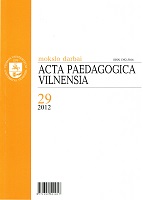PROFESINIO TAPATUMO VYSTYMASIS IR CURRICULUM STRUKTŪROS KOMPONENTŲ ĮGYVENDINIMAS UNIVERSITETE: STUDENTŲ PATIRTIS
DEVELOPMENT OF PROFESSIONAL IDENTITY AND IMPLEMENTATION OF CURRICULUM STRUCTURE COMPONENTS AT UNIVERSITY: EXPERIENCE OF STUDENTS
Author(s): Simona Crisafulli, Vilma ŽydžiūnaitėSubject(s): Education
Published by: Vilniaus Universiteto Leidykla
Keywords: curriculum1; fenomenografija2; profesinis tapatumas3; universitetas4;
Summary/Abstract: In the article, there are described experiences of students, which highlight relationships between the development of professional identity and the implementation of curriculum structure components at a university. Professional identity is discussed as the educationally suggestible process. This phenomeno-graphic research integrates participant and social construction knowledge positions, and its results show that the curriculum structure, which stipulates the recognition of the study area, influences the de-velopment of professional identity among students. The research question is as follows: Which curriculum structure components are relevant to professional identity development among university students? The research object is the interaction between the development of professional identity and the components of curriculum structure. The aim was to reveal an interface between the components of curriculum structure and the development of professional identity among university students. The sample consisted of 42 BA students (3rd and 4th years) involved into the study programmes of social sciences (sociology, education, psychology, social work, law, policy). For data collection, semi-structured interviews were ap-plied, and for data analysis phenomenography was used. The participants were exceptionally focused on the content of the study subjects, their didactics and teaching methods, organisation of study prac¬tice, deep self-cognition didactic and pedagogic competencies of lecturers as well as their personal and professional authority. The findings have highlighted the professional identification of a student to depend on the factors that later determine the results of this process, i.e. the development and formation of the student’s individualized basis of professional knowledge, which is flexible and depends on external (contextual) conditions; internalization of pro¬fessional values, attitudes, standards and other ele¬ments of professional culture; the fundamental and empowering competence of a student, which allows one to construct the conscious life, both private and professional; the structure of the competence should include the autonomy of a student (from private and professional points of view), professional self-determination and the well-developed professional indentity. Key words: curriculum structure, professional identity, experience of students, phenomenography
Journal: Acta Paedagogica Vilnensia
- Issue Year: 2012
- Issue No: 29
- Page Range: 123-132
- Page Count: 10
- Language: Lithuanian

